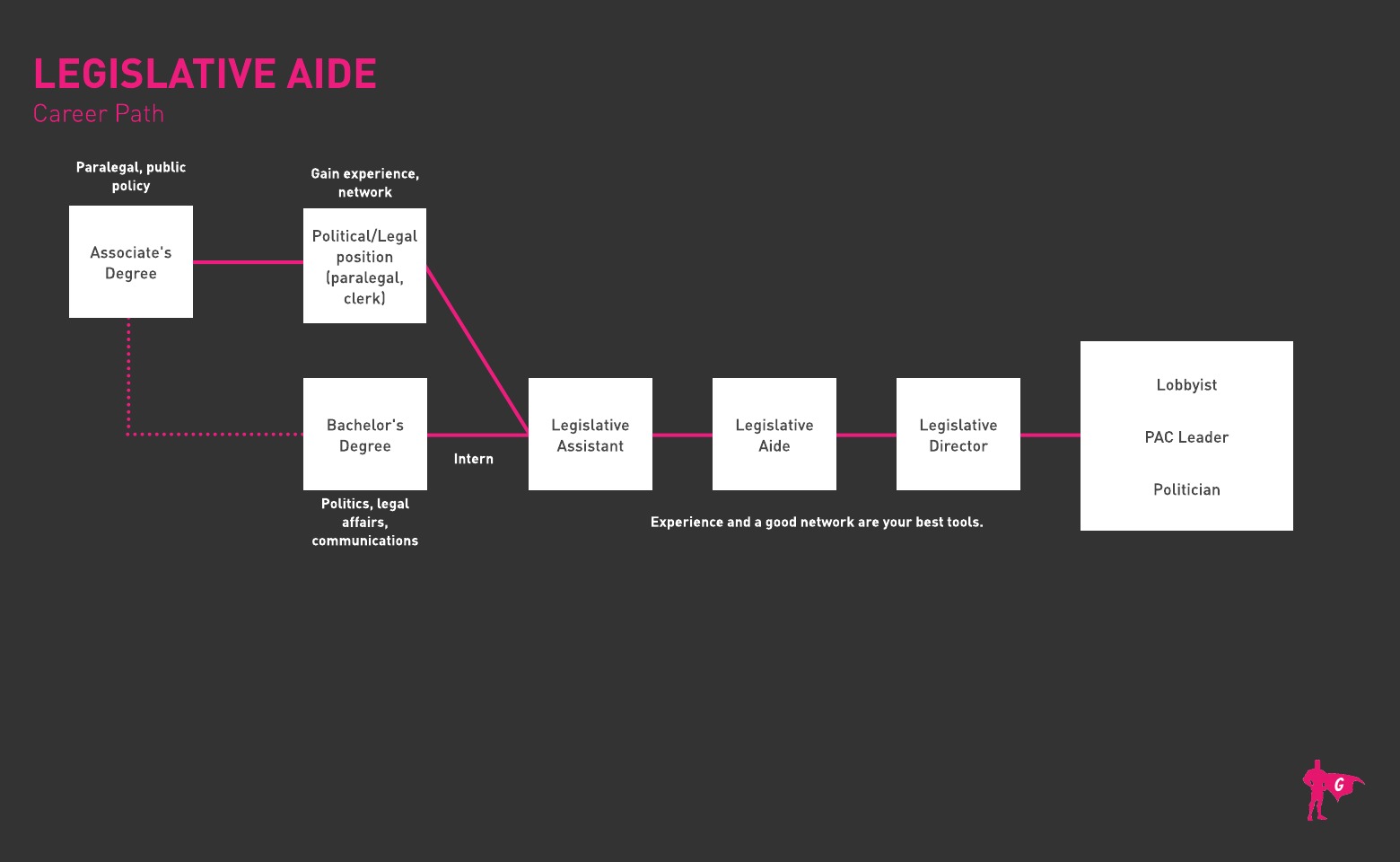Spotlights
Legislative Assistant, Policy Analyst, Government Affairs Associate, Legislative Coordinator, Legislative Analyst, Legislative Researcher, Government Relations Specialist, Policy Advisor, Legislative Advocate, Public Policy Associate
A Legislative Aide provides support to legislators or other elected officials. This can involve hearing constituent concerns, helping draft speeches or legislation, and preparing reports for the official. They also can be responsible for helping the official with his or her schedule.
It is important for an elected official to have a good staff. One person does not do the job of elected representative alone, even at a local level. They often need aides or assistants to help with everything from office work to preparing for an important vote.
- Being able to help cause positive change for citizens.
- Feeling you are a valuable part of a team.
- Being able to think creatively and problem solve.
A legislative aide works primarily in an office setting with a team of other professionals. Each office will typically have staff who have worked with the elected official for many years, though some aides may work for several officials during their career.
Each day, an aide will help prepare their boss for his or her job:
- Connect with citizens and direct them solutions, or bring their concerns to the elected official.
- Compile research for legislation, or surveys for constituent input.
- Meet with other aides, sometimes for other officials, to help move the government along.
- Help create press releases, legislation, and speeches.
When travelling, an elected official will need aides to travel as well. Many will need to remain in their office while the official is gone. There may be a need for late hours when a large project is reaching a deadline.
Because an official can be voted out, the aide may lose their job with the election. However, some elected officials will keep aides on due to their knowledge of the office systems.
Kỹ năng mềm
- Tư duy phản biện và giải quyết vấn đề
- Strong Oral and Written Communication Skills
- Able to sustain strong interpersonal relationships.
- Active Listening Skills
Kỹ năng kỹ thuật
- Strong word processing and other computer skills
- Strong understanding of legislation and legislative process
A legislative aide can work for an elected official, typically in a state or Federal legislature. They may also work for a city council member or other larger municipality.
A legislative aide is typically expected to have a Bachelor’s Degree as well as one or several internships. Internships for this field are typically unpaid. You will need to be able to support yourself while you participate in the full-time job that is a legislative internship.
There is an increase in polarization in government in the United States. This has made it more challenging for aides in opposing party offices to draft legislation and operate in a bi-partisan fashion.
The level of aides in a particular office can depend heavily on the elected official. Some prefer to have far fewer staff to save money.
- Tham gia vào Chính phủ Sinh viên
- Consume media about US history
- Try to understand rules and how they work.
- Legislative Aides usually have a bachelor’s in a legal major, or in political science, communications, public administration, or related subjects
- Many augment their academic experiences with an internship where they can gain real-world practice under pressure
- A firm grasp of legislative processes and special interest policies is essential
- Aides often need to learn how to perform a range of administrative duties such as scheduling appointments, planning travel, tracking issues, taking meeting minutes, helping with campaigns, and meeting people on behalf of the Congressman they work for. Much of this will require On-the-Job training
- English, writing, and legal research are all required topics to master
- Aides may need to learn how to write a variety of materials, including letters, persuasive speeches, press releases, online content, or even draft legislative wording
- Stock up on courses like English, writing, speech, history, psychology, politics, and marketing
- Check out job ads and the Congressional Management Foundation’s Legislative Assistant job description well ahead of applying for jobs. Plan activities to help you prepare for the listed duties
- Participate in debate club and student government to hone your skills
- Write and try to publish articles on websites, papers, magazines, or LinkedIn regarding legislative topics
- Read speech transcripts, public correspondence and messaging, and books on the legislative process
- Apply for internships and volunteer to help with campaigns
- Ask local Legislative Aides if you can shadow them or if they can mentor you in exchange for assistance with administrative tasks
- Đừng bỏ bê việc học tập trong khi tham gia vào các hoạt động chính trị! Bạn phải tìm được sự cân bằng phù hợp và cho phép bạn ưu tiên việc học ở trường
- Read articles such as Grand Canyon University’s What It’s Like Being a Legislative Aide to gain insight into the day-to-day routine

- The best way to find work as a legislative aide is to start building connections as soon as possible. This can mean volunteering for a campaign as well as interning in a government office. Being able to show you have administrative experience will help as well, particularly if you are trying to find employment without a four-year degree.
- Internships can take place outside of a legislative office as well. There are some political organizations or non-profits that can provide experience and networking as well.
- During your internships, be sure to find people who can act as mentors and work hard to stay connected with them. This will help you the most in finding opportunities and being led to new positions.
- Become familiar with the person you’ll be helping if you are offered a job. Be able to speak a bit about them during an interview where they might ask, “Why do you want to work for this particular member of Congress?
- Check out Racked’s Capitol Hill Staffers Explain DC’s Complex Dress Codes to gain insight into the right wardrobe
Non-Profits
- College to Congress: internships in DC
A great resource will be your own state’s legislature and web resources.
Các trang web
- CIA World Factbook
- Hướng dẫn trích dẫn
- Bộ luật Quy định Liên bang
- Congress.gov
- Văn phòng Ngân sách Quốc hội
- Lệnh điều hành
- Federal Judiciary Courts
- Đăng ký liên bang
- Bảng chú giải thuật ngữ lập pháp
- Văn phòng Trách nhiệm Giải trình Chính phủ
- Văn phòng Xuất bản Chính phủ
- Thông tin chính phủ
- Thư viện luật
- Thư viện Quốc hội Hoa Kỳ
- National Association of Counties
- Trung tâm Quốc gia về Tòa án Tiểu bang
- Hội nghị quốc gia của các cơ quan lập pháp nhà nước
- Thư viện Tổng thống
- Tòa án tối cao
- The Legislative Process: Executive Business in the Senate (Video)
- Tài liệu hiệp ước
- Các tiểu bang và vùng lãnh thổ hoa kỳ - Hướng dẫn về luật trực tuyến
- Uniform State Law Commission
- Liên Hiệp Quốc - Luật quốc tế
- UsAgov Dữ liệu và Thống kê
- Nhà Trắng
- Hiệp hội các tổ chức phi chính phủ thế giới
Sách vở
- A User's Guide to Democracy: How America Works, by Nick Capodice and Hannah McCarthy
- How Washington Actually Works For Dummies, by Greg Rushford
- Legal Writing in Plain English, by the Chicago Guides to Writing, Editing, and Publishing
- The Declaration of Independence and the Constitution of the United States of America
Training to be a legislative aide provides training for several other career paths:
- Paralegal
- Thư ký pháp lý
- Trợ lý hành chính
- Hòa giải viên
- Legislative Affairs Director
You may also find positions within your level of government outside of the elected official’s office.
Being a legislative aide can be very rewarding. If you truly believe in the mission of your elected official, you will be able to change your community in positive ways. It may take some time, even with connections, before you are able to find a position. Luckily, the training necessary will let you work in many legal areas outside of government.
Nguồn cấp tin tức

Việc làm nổi bật

Các khóa học và công cụ trực tuyến

Kỳ vọng về mức lương hàng năm
New workers start around $60K. Median pay is $78K per year. Highly experienced workers can earn around $99K.






